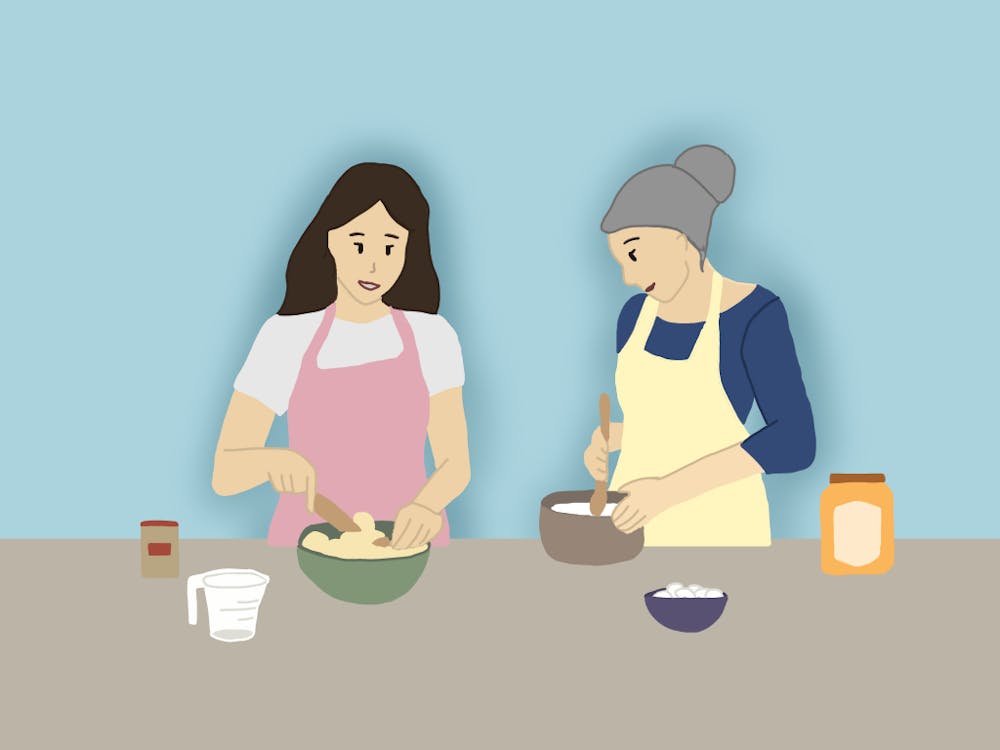The red brick and white trim facade of 109 East Jefferson Street welcomes massage therapy clients and political refugees.
On a breezy Tuesday morning the antebellum-style porch that adorns the building hosts a small group of ESL (English as a Second Language) students - recently arrived Afghani refugees.The class is one of many avenues through which refugees receive aid from the Charlottesville branch of the International Rescue Committee.
Volunteer teacher Ken Reagle twists around in his chair to sketch something on the dry-erase board propped up behind him.
Green marker in hand, his rudimentary illustration is nothing more than a small rectangular box with a slightly shaky line protruding from its top left corner.
With the delight of clarity familiar to many a Pictionary player, Alia - an Afghani refugee - realizes immediately that the drawing represents the word she was struggling to grasp: "pan."
"For eggs," she says in a departure from her native Dari.
Yes. A pan is used to cook eggs. Now they can move on to the next word.
House of fortune
The International Rescue Committee's sign used to hang in the front lawn. But that was before it was blown down in a storm.
The IRC stands strong against other tempests, though. War, violence, persecution - these are the atrocities the relief organization protects against.
An Albert Einstein brainchild, the IRC opened in 1933, at the behest of the genius physicist, to help Nazi-threatened Europeans flee their homeland. Today, it is one of 10 organizations that contracts with the U.S. State Department to resettle refugees from around the world.
Since opening in 1998, the Charlottesville IRC has guided over 400 refugees through the first steps in the process of resettlement in the United States. It is a diverse clientele - Bosnians and Sudanese among them - that also is among the most well-known in the globe: Less than one half of one percent of the world's refugees are granted permanent asylum in the U.S.
But once granted this asylum in the U.S., the refugees must hit the ground running. With self-sufficiency looming ahead as the ultimate goal, job placement is a top priority. But there are obstacles to this.
"Because these refugees have been through very difficult circumstances, they are not being admitted because they have skills that are necessarily transferable to the U.S.," said Susan Donovan, director of the Charlottesville IRC.
Among those skills is speaking the native language; English, of course. And although refugees usually are placed in jobs before they have a chance to learn much English, acquiring those language skills is crucial.
"It would be as if you were plopped down in Afghanistan without speaking Dari," Donovan said. "You would need to just survive."
In addition to the IRC's on-site ESL classes, a new similar class for the University's refugee employees and a Madison House program that falls under Hoo's Out There, add to a support network for these new arrivals.
"The University has always had an supported education and training for employees," said Deb Myers, training manager at the University Human Resources Training Division. "We added [ESL] to our agenda of classes this fall knowing there were a number of people who needed that support."
After work, tutoring sessions through Madison House's IRC ESL program help refugees learn such essentials as how to grocery shop, ride the bus, and introduce themselves.
But even the conveyance of these intrinsic day-to-day activities still cannot catapult these refugees into high-paying American jobs, no matter how well-educated they were in their native countries.
"Instead of having an impact on what kind of job [they] can get, it has an impact on whether they're successful in the job," Donovan said.
That rang true for Farhad, an Afghani refugee, when he reported to Krispy Kreme for his first day of work - at 6 a.m. The 21 year-old who counts "Gone with the Wind" among his favorite books - he read the American classic in Farsi translation - got the job after a golf course he applied to said he didn't know enough English.
And even those with professional degrees have to take blue-collar jobs while they prepare for the arduous task of recertification in their field.
"Students living in student housing are probably being served by refugee workers," Donovan points out. "Either they're cleaning the dorms or they're serving food in the dining halls and these are people who might have been doctors or lawyers in their own country."
The way they were
Hassan, also an Afghani refugee, is hesitant to reveal his former occupation.
Until three weeks ago he was a doctor, practicing in Pakastani clinics, and before that, serving as an army doctor in Afghanistan.
Now, while IRC tries to find him employment, Hassan attends the morning ESL classes at the IRC office with his wife, Nasreen, and 11 year-old son, Jalil.
"Mr. Ken help us everyday and we learn a lot in two weeks," he says, referring to volunteer Ken Reagle.
Twenty years ago Hassan was learning English in Afghanistan. When Russian forces invaded the Middle Easternnation, they closed the American Language Center where he studied.
More recent changes in Afghanistan also have stifled educational opportunities there.
The Taliban regime's strict impositions on women force females to be covered head to toe in the chadari and deny them the right to attend school and work.
Twenty-year-old Marina was preparing for her university entrance exams when she was barred from attending. She came to rely on private English classes not only for her own education, but to inform the rest of the world about Taliban oppression.
Impassioned about women's rights in her country, she translated between English-speaking journalists - many from the BBC - and Afghani women.
"They're not living. They don't have a life that means living," Marina says.
While Marina is an exception to the cultural norms of her former home, her ambitions sound well-grounded when she discusses them on American soil.
She would love to work in America as a translator, continuing the work she left behind in Afghanistan, and be a voice for those who don't know how to speak English.
Similarly, when Hassan asks how many grades in school his son has to go through - and is told 12 - his next question is "then he can go to university?"
And it is University students, who work through Madison House, that help adult refugees attain goals similar to those Hassan has for his son. These tutors also forge close-knit connections with their pupils that bridge the cultural divide between an old homeland and a new one.
"It gives them kind of a lifeline out to the English-speaking community," Donovan said.






